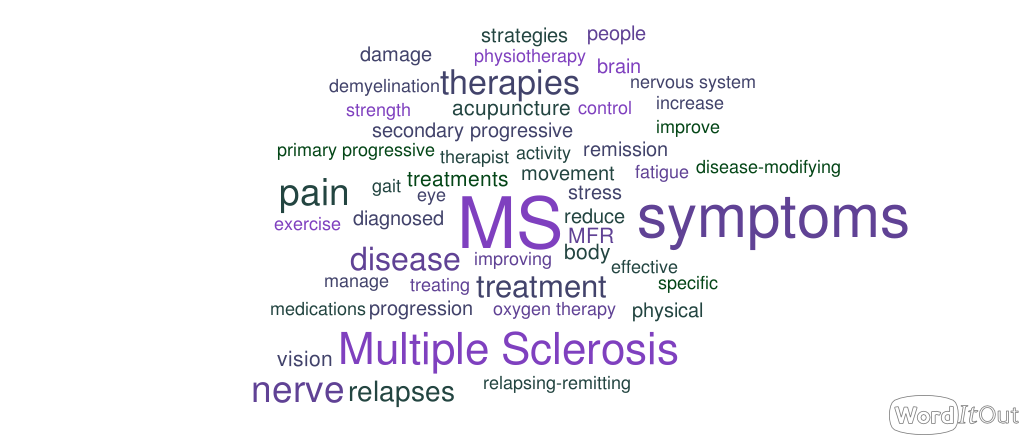
What is MS? How can we help?
Multiple sclerosis (MS) is a potentially disabling disease of the brain and spinal cord. It is an auto-immune disease, where the immune system turns on itself and attacks the nerve cells, damaging the protective sheath. This process is called demyelination and it disrupts ‘messages’ transmitted from and to the brain, slowing, distorting or blocking them. Eventually, the disease can cause permanent damage or deterioration of the nerves.
Signs and symptoms of MS vary widely and depend on the amount of nerve damage and which nerves are affected. Some people with severe MS may lose the ability to walk independently or at all, while others may experience long periods of remission without any new symptoms. There's no cure but treatments can speed recovery from attacks, modify the course of the disease and manage symptoms.
Additional symptoms can include;
- Numbness or weakness in one or more limbs that typically occurs on one side of the body at a time.
- Electric -shock sensations with certain neck movements, especially bending the neck forward. (l'hermitte sign).
- Tremor, lack of coordination or unsteady gait.
- Partial or complete loss of vision, usually in one eye at a time, often with pain during eye movement or prolonged double or blurry vision.
- Slurred speech.
- Fatigue.
- Dizziness.
- Problems with bladder or bowel function.
Most people with MS have a relapsing-remitting disease course. They experience periods of new symptoms or relapses that develop over days or weeks and usually improve partially or completely. These relapses are followed by quiet periods of disease remission that can last months or even years.
Small increases in body temperature can temporarily worsen signs and symptoms of MS, but these aren't considered true disease relapses. At least 50% of those with relapsing-remitting MS eventually develop a steady progression of symptoms, with or without periods of remission, within 10 to 20 years from disease onset. This is known as secondary-progressive MS.
The worsening of symptoms usually includes problems with mobility and gait. The rate of disease progression varies greatly among people with secondary-progressive MS. Some people with MS experience a gradual onset and steady progression of signs and symptoms without any relapses, known as primary progressive MS.
Treatments
Therapies
An occupational therapist can help you make adjustments to your work area or the way you perform certain tasks that will cause less stress on your body.
Talking with a counsellor can help strengthen your belief in your abilities and teach you strategies for dealing with stressful situations. Mediation and Mindfulness can also be effective.
Complementary Therapies
Acupuncture appears to modestly reduce many types of chronic pain, so it's not surprising that many people with MS are interested in trying it. While the studies on the effectiveness of acupuncture for MS symptoms are somewhat mixed, most suggest that it may have a beneficial role.
MS can be difficult to treat, and a combination of treatments may be necessary to control your symptoms. If you're having trouble finding relief for your symptoms, it may be worth trying acupuncture. But if your symptoms don't begin to improve within a few weeks, acupuncture may not be the right treatment for you.
This is a hands-on treatment performed on the skin with no oils or creams. By following the unique lines of tension in each patient’s body, the MFR therapist can reach deeply into the tissues and uncover significant restrictions.
MFR involves applying gentle, sustained pressure into these connective tissue restrictions to eliminate pain and restore motion. By going slowly and waiting for the body’s natural rhythm, the fascia responds by elongating, rehydrating, and reorganizing. If you're having trouble finding relief for your pain, it may be worth trying MFR. But if your symptoms don't begin to improve within a few weeks, MFR may not be the right treatment for you.
This is an effective, and safe means of treating and managing the various symptoms of MS, particularly fatigue and ‘brain fog’. Oxygen therapy is an intermittent inhalation of 98% oxygen in a barochamber at a pressure higher than the normal atmosphere.
Oxygen Therapy causes a dramatic increase in the amount of dissolved oxygen carried by the blood which enables oxygenation of areas with compromised circulation. It also activates oxidant-antioxidant system, stimulates angio- and neurogenesis, modulates inflammatory response, induces brain neuroplasticity and possesses analgesic effect. Oxygen therapy involves a 15-session initial protocol, consecutive sessions, then weekly sessions to help manage symptoms
Disclaimer: The information provided on this website is not intended to be a substitute for professional medical advice, diagnosis, or treatment.
